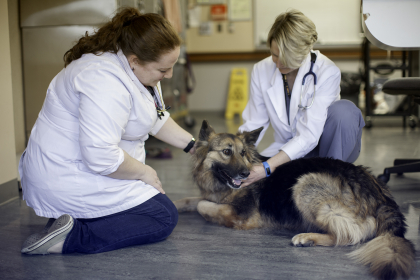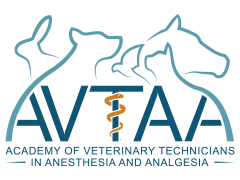Veterinary Anesthesia Refresher Certificate

Our patients like to keep us on our toes when it comes to anesthesia, therefore it's essential for Veterinary Technologists, Technicians and Veterinarians to have the skills needed to ensure that our patients wake up happy and healthy! Anesthesia is one of the most challenging skills in our industry - it requires exceptionally high standards of care from theoretical knowledge to practical skills, equipment maintenance and trouble shooting and problem solving and treatment of complications during anesthesia.
Our clients and patients expect the best: the purpose of this Anesthesia Refresher certificate is to ensure you have the knowledge and skills necessary to optimize the health care of dogs and cats under anesthesia.
- About the program
- Program instructor
- Program objectives
- Courses
- Admission Requirements
- Tuition
- Credential
About the program
The Douglas College (British Columbia, Canada) Veterinary Anesthesia Refresher Certificate is a comprehensive anesthesia program is targeted to registered veterinary technologists (RVTs) with an interest in small animal anesthesia and analgesia, especially those with an interest in obtaining a veterinary technician specialist (VTS) credential in this area. Veterinarians that have completed their diploma in Veterinary/ Animal Health technology and internationally equivalent training (including veterinary nurses) are welcome to register for this certificate program.
The Veterinary Anesthesia Refresher Certificate program consists of 4 courses: the first 3 courses are online, asynchronous - a flexible, self-directed format that includes access to a Douglas College instructor to answer any questions and to facilitate discussions. Participants will be required to obtain certification as a RECOVER Certified Rescuer in Basic and Advanced Life Support online courses as part of the program. Completion of the 3 online asynchronous courses is not required for registration for the VTAN 1300 wet-lab course. The VTAN 1300 wet-lab course in the Refresher Certificate program is a 4 day in-person, simulations based, wet lab (at Douglas College, close to Vancouver in beautiful British Columbia, Canada). This includes use, maintenance and troubleshooting of anesthetic equipment, general anesthesia case studies, protocols and simulations and CPR simulations.
The online courses have been RACE approved for continuing education credit in jurisdictions that recognize RACE approval. The in-person wet lab accreditation has been paused.
These courses have been endorsed by the Academy of Veterinary Technicians in Anesthesia & Analgesia and the CE hours can be used towards RVTs AVTAA application.

Please note:
- Registrants that are not RVTs (i.e. veterinary assistants and non-registered technicians) are not eligible to apply to AVTAA after completion of these courses
- Passing these courses does not guarantee passing of the AVTAA application or examination
- Registrants that are not RVTs (i.e. veterinary assistants and non-registered technicians) are not eligible to apply to BCVTA after completion of these courses
Program instructor
Ashley De Santis, MEd, RVT, VTS (Anesthesia & Analgesia) has been an active member of the BCVTA since graduation at the University College of the Cariboo in 2003. Her experience working in emergency and specialty medicine led her to the goal of providing gold standard anesthetic care to all patients. In 2009, Ashley was the first RVT in British Columbia achieve her Veterinary Technician Specialty certification in Anesthesia & Analgesia. Her other passion for training and mentoring fellow employees led her to her Lab Facilitator position at Douglas College in 2010 and her Open Learning Faculty Role at Thompson Rivers Veterinary Technology Program. As Ashley’s instructing experience grew, so did her passion for curriculum and instructional design, simulation education, and pedagogical best practices which led her to complete her Master of Education (Health Education & Active Living) through Simon Fraser University. Ashley now holds a full-time faculty instructor role in the Douglas College Veterinary Technology Program.
Program objectives
Registered Veterinarians Technologists and Technicians (RVTs) are responsible for the safe administration and monitoring of anesthetic and analgesic plans prescribed by the Veterinarian for their patients, as well as the treatment of anesthetic complications and emergencies. This course will enable RVTs to perform these tasks confidently and safely by ensuring they:
- Establish (or refresh) a basic foundational knowledge of those aspects of anatomy, physiology, pharmacology and pathology that relate directly to anesthesia and analgesia in veterinary patients.
- Demonstrate a detailed knowledge and understanding of the drugs and fluids used in anesthesia and analgesia, as well as the ability to safely administer those drugs and fluids.
- Demonstrate an understanding of the types and functions of the equipment required for delivery and monitoring of veterinary anesthesia, commonly found in first opinion veterinary hospitals, as well as the skills required to use and maintain that equipment.
- Understand and apply applicable provincial and federal legislation in Canad
- Apply the knowledge & skills obtained, to the planning and safe execution of basic anesthetic protocols and analgesia in dogs and cats.
- Develop critical thinking, analytical and problem solving skills to predict and/or quickly identify deteriorations in patient condition and to prevent anesthetic emergencies.
- Demonstrate an ability to safely administer and monitor anesthetics in dogs & cats
- Apply protocols for the treatment of anesthetic emergencies including CPR.
Courses
NOTE: You must successfully complete the online courses in order before registering for the next online course. (i.e. VTAN 1000 is a prerequisite for VTAN 1100; VTAN 1100 is a prerequisite for VTAN 1200. If there is more than 2 years between each course, the prerequisite course will no longer be valid. Please contact the CEHS department for more information.
Admission Requirements
Proof of one of the following must be submitted to Continuing Education, Faculty of Health Sciences:
- Current registration as a Veterinary Technologist or a Registered Animal Health Technologist in any North American (Canada/ USA) Jurisdiction or;
- Degree or diploma in Veterinary Technology, Animal Health Technology or Veterinary Nursing or;
- Veterinary degree (Doctor of Veterinary Medicine or international equivalent)
If the applicant’s diploma or degree is not issued by an English speaking country* they must also submit proof of English Proficiency via one of the options listed here.
If an applicant does not have one of the above qualifications they should send a resume detailing their relevant veterinary work experience AND a letter of support for their application from a Canadian or US DVM, which we will review before acceptance.
To apply, email your admission requirements and we will review them.
Upon approval you will receive and application form to complete and then contacted for payment.
* Countries with English language systems/institutions (Where English is a primary, official language and the language used for education)
| American Samoa | Cayman Islands | Kenya | St. Vincent |
| Anguilla | Dominica | Malta | Trinidad and Tobago |
| Antigua | Falkland Islands | Mauritius | Turks and Caico Islands |
| Australia | Fiji | Montserrat | US Virgin Islands |
| Bahamas | Ghana | New Zealand | Uganda |
| Barbados | Grenada | Seychelles | United Kingdom |
| Belize | Guam | Singapore | United States of America (USA) |
| Bermuda | Guyana | South Africa | US Virgin Island |
| British Virgin Islands | Irish Republic | St. Kitts and Nevis | |
| Canada | Jamaica | St. Lucia |
Tuition Summer
- VTAN 1000 - $381.00
- VTAN 1100 - $381.00
- VTAN 1200 - $381.00
- VTAN 1300 - $988.00
Note: All fees are in Canadian dollars (CAD).
Credential
Upon successful completion of all four courses, you will be granted a Douglas College Continuing Education Program Certificate issued by the Graduation Office in the Office of the Registrar. All courses (VTAN 1000, 1100, 1200, 1300) must be completed to receive a credential.
Note: Recognition of Course Completion with continuing education hours will sent as each course is completed.
Any additional questions can be directed to the CEHS Program Assistant by email at cehs@douglascollege.ca or by phone at (604) 777-6531.